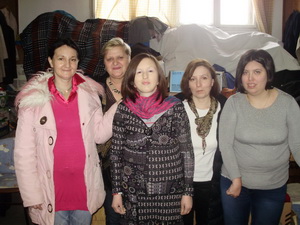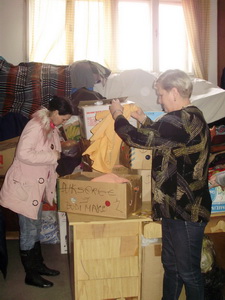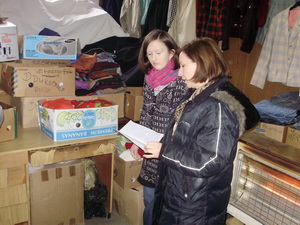 In the past three years – owing to the project organized by the Ženski centar Užice female centre – 11 women (out of which five disabled persons) have been given an opportunity to earn money, socially vulnerable families gained access to humanitarian assistance and the town an opportunity to reduce the problem of textile waste in an eco-friendly manner.
In the past three years – owing to the project organized by the Ženski centar Užice female centre – 11 women (out of which five disabled persons) have been given an opportunity to earn money, socially vulnerable families gained access to humanitarian assistance and the town an opportunity to reduce the problem of textile waste in an eco-friendly manner.
On the premises of former textile company “Cveta Dabić”, in downtown Užice, four women are diligently classifying wardrobe. Cotton-made clothes are placed together, and they are taking off zippers, buttons and other haberdashery items from jackets, coats, sweatpants etc. Baby clothes are classified and all pieces of wardrobe new generations might wear are set aside to be given to the social services – humanitarian assistance for the socially vulnerable families.
The Ženski centar Užice ((ŽCU) launched the program “Sustainable social services for population via textile collecting and recycling” in July 2010. These hardworking ladies are classifying wardrobe citizens bring two times a week or during special-purpose campaigns in cooperation with schools, kindergartens, associations of young people, the Red Cross etc. Together with Project Coordinator Marina Tucović, textile engineer, they are eagerly expecting to launch the recycling process.
– 15,000 clothing items have been donated so far. More than 280 families from the Zlatibor County are social services’ users on a monthly level. We have 35 tonnes of textile ready for further recycling in our warehouse. The products are textile regenerators envisaged for new use. The most important thing is that 11 women have been given an opportunity to earn money owing to this project. Five of them are disabled persons, the two were women over 50 who have been laid off and managed to acquire retirement rights by working here, says Marina Tucović.
The idea to launch the project which will enable employment of women belonging to categories who are facing difficulties when it comes to employment: single mothers, victims of violence, disabled persons etc. was born during the conversations between Marina, at that moment unemployed herself, and Radmila Gujaničić, the president of the Board of Directors and a coordinator of economic programs of ŽCU.
– We have been looking for a way to link women who have knowledge and the ones who have not had an opportunity to work, says Radmila, and adds that she has noticed textile recycling labels during her visit to Canada.
 The Recycling Centre gives multiple results. The activities of social services help vulnerable population. Women did not have an opportunity to find work anywhere have been employed here. Last but not least, this also serves to educate the community about the importance of environmental protection, the need for primary selection of waste, use of textile as recycling raw material, she underlines.
The Recycling Centre gives multiple results. The activities of social services help vulnerable population. Women did not have an opportunity to find work anywhere have been employed here. Last but not least, this also serves to educate the community about the importance of environmental protection, the need for primary selection of waste, use of textile as recycling raw material, she underlines.
Recycled textile regenerators are raw goods, used again in the construction sector for the preparation of insulation material, road construction, furniture industry (this material is used for soft parts of the furniture), car industry etc.
The municipality of Užice is where the regional landfill site Duboko is and where waste disposal in this part of Serbia will be situated. As auxiliary goods, regenerators are imported in Serbia and this centre would give us a local product, Marina adds. In addition, the launch of the recycling centre is listed in the Action Plan of the Strategy of Sustainable Development of Local Self-Government.
So far, the Project was part of public works of the National Employment Agency – Užice branch, and Javni radovi public works, financed by the very municipal self-government.
In the first year (2010), the budget was RSD500,000. Having in mind that the competitions lasted for six months, diligent women volunteered in the Centre during the period before the continuation of their participation.
In a space filled with wardrobe, Jelena Kremić (34) from the village of Gostinice is touching the sweater. – It is cotton, she tells her colleague Denis Ljubunčić.
It is Jelena’s first employment. She admits that she was beyond happy when she received the call.
– I was in shock. I was so surprised that I did not know what to say. I do not travel, I have cousins in Užice and I’m staying at their house. In a village, sometimes I have not left the house for days. Now I go for a walk, I have a salary and I can buy makeup. I’m helping my family as well, this girl explains.
This is first employment for Sanja Sparić (27) as well. This modest girl says that Marina called her as well.
– We went to training too, in order to learn to make a difference between the types of textile and what we should take off. I do not find anything hard to do. I like it when we are here alone and classify wardrobe. And I like Thursday and Friday as well, when people are bringing the wardrobe, she describes.
 56-year-old Velinka Kovačević is the most experienced one. She has been employed in the textile industry for 34 years.
56-year-old Velinka Kovačević is the most experienced one. She has been employed in the textile industry for 34 years.
– Sometimes they ask me for advice, although we have all undergone training. This is the first time for me to recycle. If the project continues, I may get few more months of employment service and fulfil requirements to retire, Velinka hopes.
When the current contract expired by mid January, in accordance with the Project of Public Works of the National Employment Agency, the fact that they were all ready to volunteer until the contract had been expanded or a new donor found, best reflects their attitude towards the Recycling Centre. The four of them, together Svetlana Čubrak, who had a GP appointment when the reporter visited them.
– In order to start recycling, it is necessary to purchase a machine which is “cutting” textile. According to the business plan, this machine costs EUR147,000, and money for renting of facilities is not included, explains Marina Tucović.
This type of recycling is still relatively new in Serbia. It is best known in Italy, Japan and Canada. The international statistics shows that between 3 and 8% of community waste is textile. A local survey in a town upon the Đetinja River has shown that this share exceeds 4%.
At the very end of 2013, the Ženski centar received good news which calmed their concerns whether they would be granted new contract via Javni radovi. They have been approved the project from EU funds, via cross-border cooperation, for a workshop for preparation of objects and wardrobe made from recycled textile, in cooperation with NGO SOS from Nikšić (Montenegro).
In 2014, we plan to conduct a market and sustainability analysis, procure the equipment for a mini sewing procedure: five sewing machines, a machine for dry cleaning and drying, an ironing machine, as well as training for women who belong to the category of hard-to-employ individuals. They expect to start sewing first clothing items in the second half of 2015.
 Government of the Republic of Serbia
Government of the Republic of Serbia















 pdf [271 KB]
pdf [271 KB]
Leave a Comment